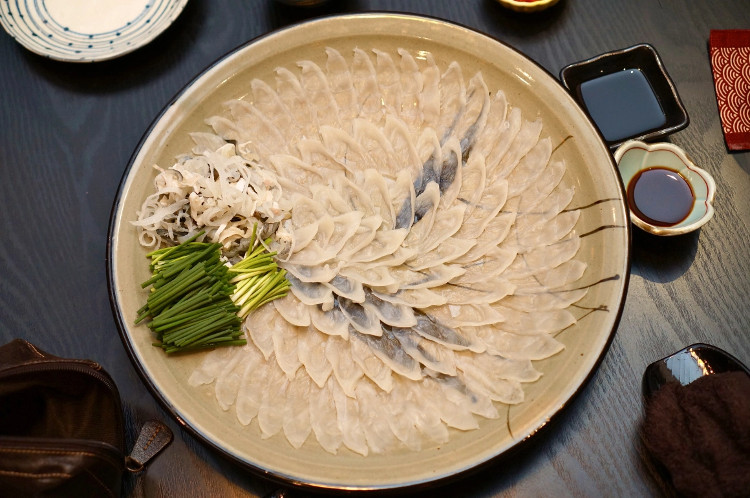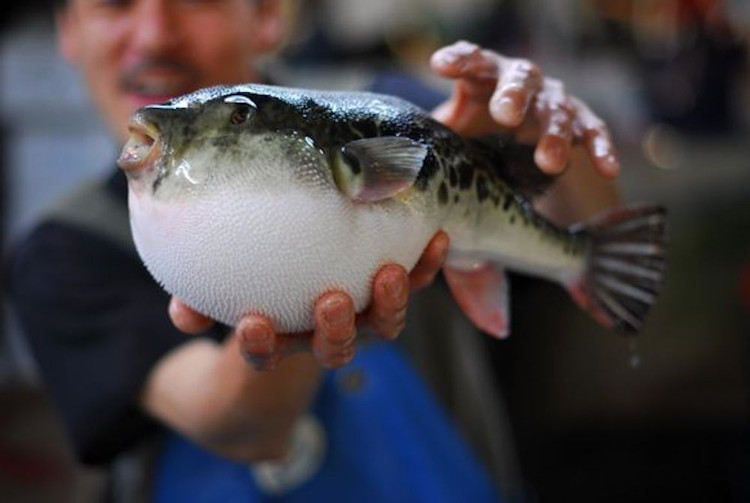The arduous journey for Japanese chefs is allowed to process puffer fish
This is one of the types of fish that requires a license to be slaughtered in Japan - Japanese puffer fish.
Japanese culinary culture is associated with fresh seafood - this is reflected in sushi and sashimi dishes.
And there's a fish, though it may not be tuna, but is always on the list of the most expensive fish in the luxury restaurants.
It is Japanese puffer fish - also known as Fugu in Japanese.

Japanese puffer fish - one of the top dishes in Japan.
This fish can give Japan millions of dollars every year. The rich are also willing to spend thousands of dollars to enjoy it.
But the problem is, this fish is in the world's most toxic creatures . On the body of puffer fish containing toxin tetrodotoxin - a powerful neurotoxin, only 1mg is enough for an adult to die in pain. Therefore, the Japanese government has made the law requiring only certified people to slaughter and trade puffer fish.

Japanese puffer fish is funny but deadly.
Even if you are the chef of a Japanese restaurant, you must not slaughter or process puffer fish without a government-issued "Fugu license" .
That is an important certificate, allowing a person to slaughter, process and trade / serve puffer fish in Japan.
And to achieve that certification is not simple
It must be recalled that tetrodotoxin is a very powerful neurotoxic, capable of killing people with just one drop. Therefore, those who can make puffer fish must have absolutely perfect skill of using knives, leaving no mistakes in the processing process.
The thing to validate their skills is the government license. To get this certificate, a chef with good skills also has to go through 2 years of training, with at least 2 years of puffer fish processing experience.
In addition, it is accompanied by a multitude of difficult theory tests that force students to achieve maximum marks.

Toxins of puffer fish are found in some parts such as liver, fish skin .
It is also important to know that the chefs do not learn to "remove the poison" , but to know "where the poison is". With puffer fish, toxins are very much in the intestines, internal organs and fish skin - these will be the parts that must be destroyed after processing. They also need to know how to avoid cutting off the toxic part - like the liver, otherwise it can be poisoned.


All poisoned fish must be taken away after processing.
The hard training process will last for at least 4-5 years, but it can be up to 7, even 10 years. At the end of the process, the chefs must undergo a final exercise: successfully extracting and processing a puffer fish, under the supervision of experienced Fugu chefs . Only when they pass the challenge will they receive the certificate.
Interesting history of puffer fish dishes
In fact, puffer fish was once a "forbidden national" dish of Japan in the 16th century, after the event that a group of samurai could not wake up because of eating it.
This is the only fish that despite the delicious taste has never been allowed to appear in the palace.

Puffer fish was once a "forbidden national" dish of Japan in the 16th century.
Over time, the ban on puffer fish was removed a few parts. Currently, Japan allows puffer fish trading, but only fish slices, not whole fish.
European countries completely banned the import of puffer fish, while the US also required the chef to have a new certificate to serve this dish.
- Why does Japan take a decade to train a professional sushi chef?
- Synthesis of the best news from June 3, 2017
- Video: Puffer fish patiently waiting for the diver to rescue you stuck
- Eye surgery for ... puffer fish
- Puffed puffer rushed with water to return to the original
- Fish can not breathe for 4 minutes in the Pacific Ocean
- Application of poison in puffer fish for pain reliever
- Tetrodotoxin: Common poison in puffer fish
- Fish turn into balls
- Japan caught poisonous fish 50 times more than puffer fish
- Specialties can be deadly
- Cross the Antarctic according to Shackleton's journey
- Will future people have mines instead of teeth?
 'Fine laughs' - Scary and painful torture in ancient times
'Fine laughs' - Scary and painful torture in ancient times The sequence of numbers 142857 of the Egyptian pyramids is known as the strangest number in the world - Why?
The sequence of numbers 142857 of the Egyptian pyramids is known as the strangest number in the world - Why? History of the iron
History of the iron What is alum?
What is alum?